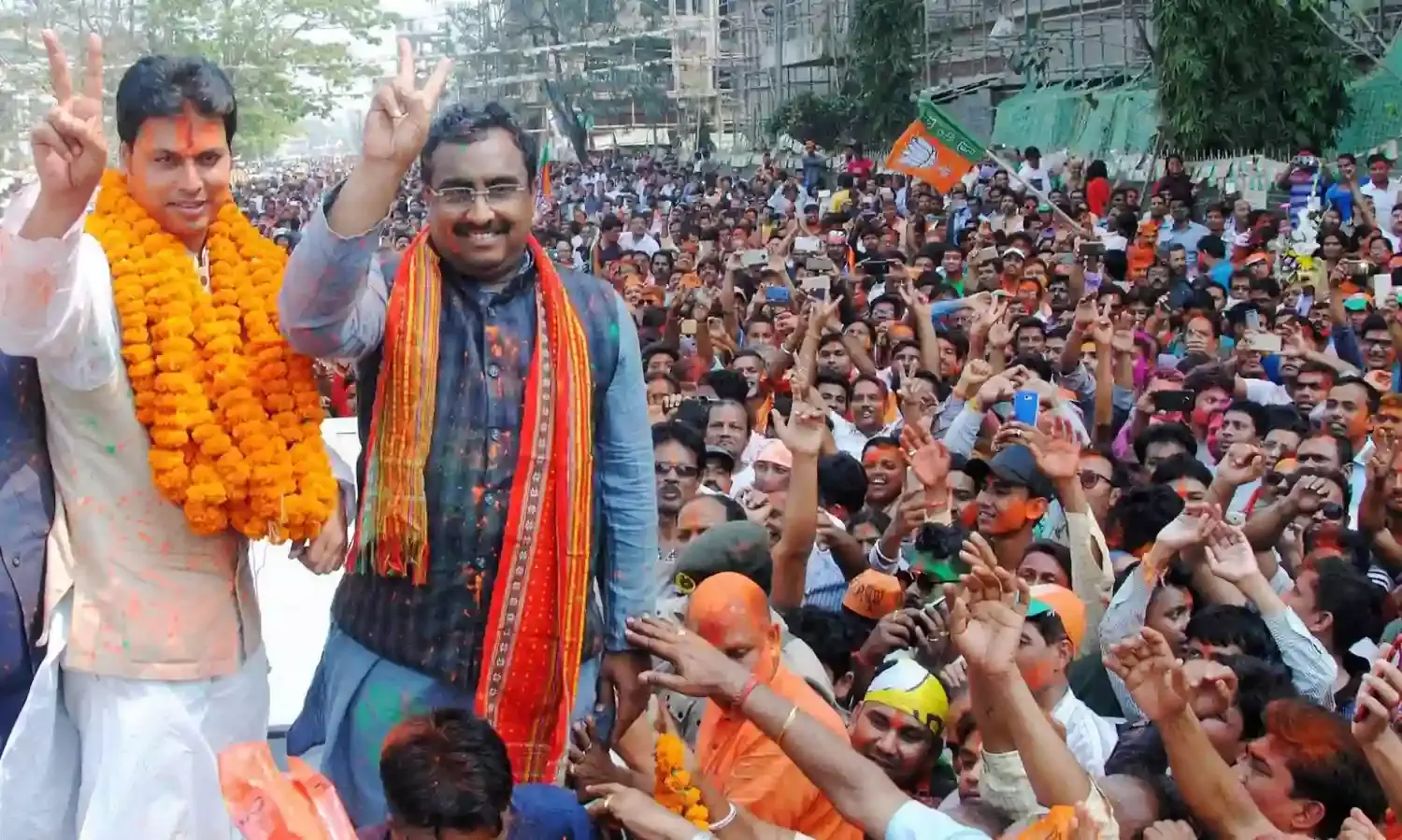From Red to Saffron
BJP's ground work broke down barriers all over the N-E

GUWAHATI: As counting of votes for the three states began this morning, it became clear early on that Tripura, that has been a bastion for the Left, was changing its colour from red to saffron. A verity of factors, not limited to anti-incumbency, led the BJP claiming victory in Tripura and could see the party form governments in Meghalaya and Nagaland, post-election the way it did in Manipur last year.
The Communist Party of India (Marxist) was in power in Tripura since 1993 and the BJP’s win sees the end of Manik Sarkar’s almost 20-year reign as chief minister, during which time he has been called ‘the poorest chief minister of India’. Humbling as that moniker may be, it ultimately did little to impact the BJP’s performance, which has been working since 2014 to mark its presence in the state and break through the red corridor.
Today’s result showed that it worked.
Apart from anti-incumbency, what worked in the BJP’s favour is the fact that it managed to woo tribal voters in a state where the once-majority indigenous Twipra people have become a minority to the larger Bengali-speaking community.
Last year witnessed violent communal clashes between sections of the two communities as indigenous groups pressed with their demand for a separate state- Tipraland. The BJP’s workers entered the scene projecting the party as not only as an anti-thesis to left ideology but also as a party that was sympathetic to the tribal bodies.
While the party did not make any public promises of ceding to demands for a separate state, it ensured that tribal faces of the party including Arunachal Pradesh chief minister, Pema Khandu, campaigned in Tripura where he said that “tribals of the state seem to be the worst sufferers in the Leftist rule, not getting proper healthcare facility, drinking water and sustainable sources of income due to anti-tribal policies of the communist government”.
In the past few years, the BJP’s groundwork has led to it being viewed favourably by tribal leaders and people and helped increase its tally from zero in the 2013 election to 32 seats (at the time of reporting and not counting its ally- Indigenous People's Front Of Tripura which had won in eight constituencies).
While the BJP will form the government in Tripura, in Nagaland and Meghalaya, the picture is less clear.
In Nagaland, which witnessed violence in some parts before, during and after elections, it is expected that hectic parleys are likely to take place in the next few days.
Latest trends showed that the Naga People’s Front (NPF) which was hit with internal strife over leadership issues through the past two years, secured 27 seats while its pre-poll alliance partners- National People’s Party (NPP) and JD(U) - won two and one each, taking its tally to 30 in a 60-member house.
The BJP meanwhile, won 12 seats and its pre-poll partner, Nationalist Democratic Progressive Party (NDPP), won 17.
These numbers and pre-poll alliance may mean little in the next few days in a state that virtually had no opposition in the last Legislative Assembly.
Although the NDPP was born as a result of former Nagaland chief minister and current Lok Sabha MP Nephiu Rio’s larger political power-play arising out of differences with the NPF, in Nagaland’s political landscape, no possible alliance can be dismissed.
Even before the state went to polls on February 27, the BJP had said that it had not ended its partnership with the NPF and that it had merely agreed on a seat-sharing equation with the NDPP.
The NPF, on the other hand, had entered into a pre-poll alliance with the NPP and JD(U), and functionaries from both parties had written to the Nagaland governor, PB Acharya, informing about their agreement, perhaps fearing a possible swoop by the BJP after votes are declared.
Post results, Nagaland chief minister TR Zeliang has said that the NPF is open to an alliance with the BJP if it proposes to do so but that the party will not form any relation with Rio’s baby- the NDPP.
An NPP functionary told The Citizen that it too was open to the idea of working with the BJP if it meant finding a solution to the Naga political dialogues.
With talks still underway with the Nationalist Socialist Council of Nagaland (Isak-Muviah) and other Naga nationalist groups, the BJP is spoilt for choice when it comes to selecting a partner. Leaders in Nagaland know that to assuage concerns and settle questions over the Naga ‘solution’, it needs to have the party in power at the Centre on board, which in this case happens to be the BJP.
In Meghalaya, the incumbent Congress has emerged as the single largest party but with a tally of 21 seats in a 60-member house, the grand old party will be on the lookout to avoid losing power if the Conrad Sangma-led NPP decides to forge an alliance with the BJP.
The NPP won 19 seats, while the BJP managed to win two. Although the two parties did not form a pre-poll alliance, they could come together like they did in Manipur last year.
While the Congress may publicly say that voters reposed their faith in the previous Mukul Sangma-led government, the BJP’s credibility had taken a hit following concerns that the party may impose a beef ban in the Christian-majority state where bovine meat is consumed in large amounts. That concern, though, is not merely about dietary habits but is indicative of alarm over the possible imposition of an ideology that stands in contrast to ground realities.
Much of what happens in Meghalaya will depend on how effectively both sides are able to woo Independents and other elected members.



